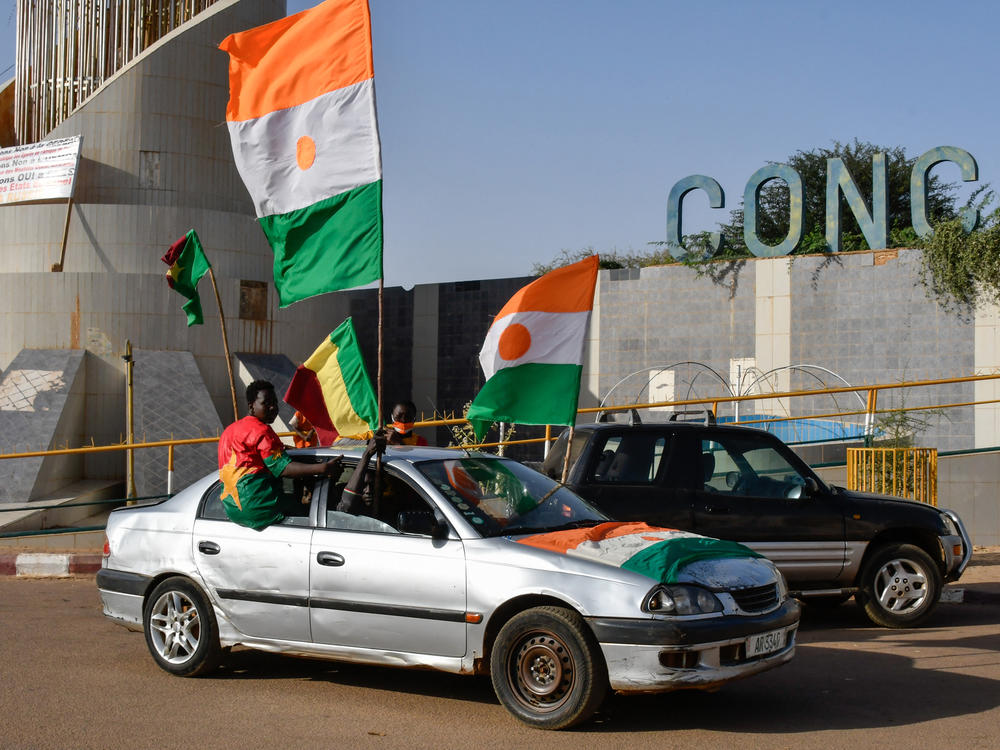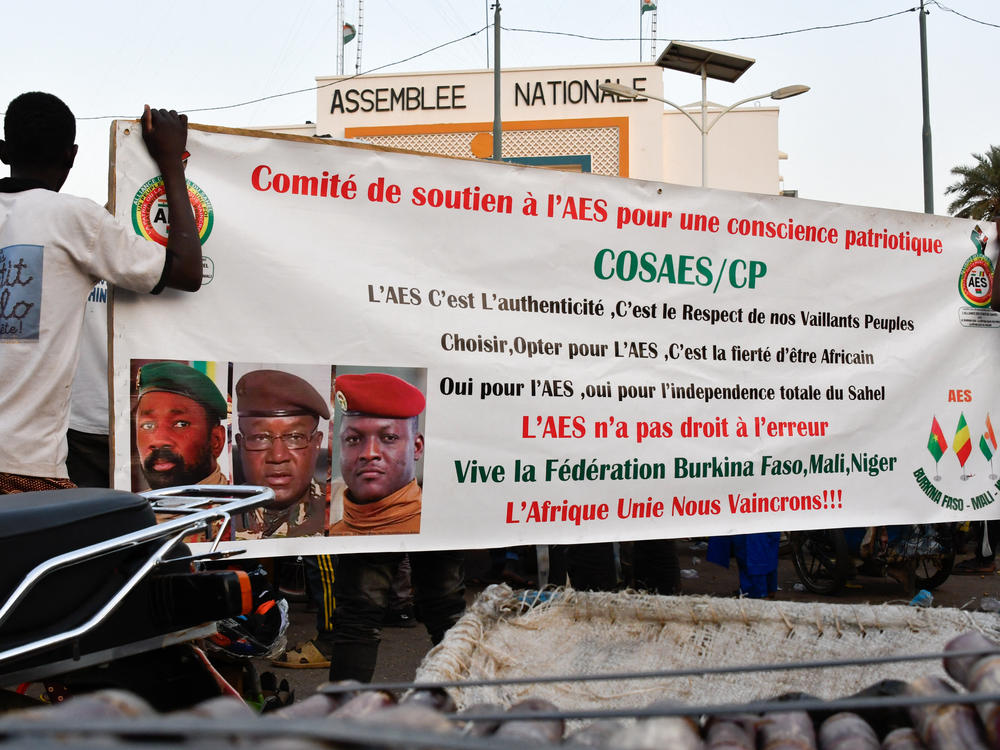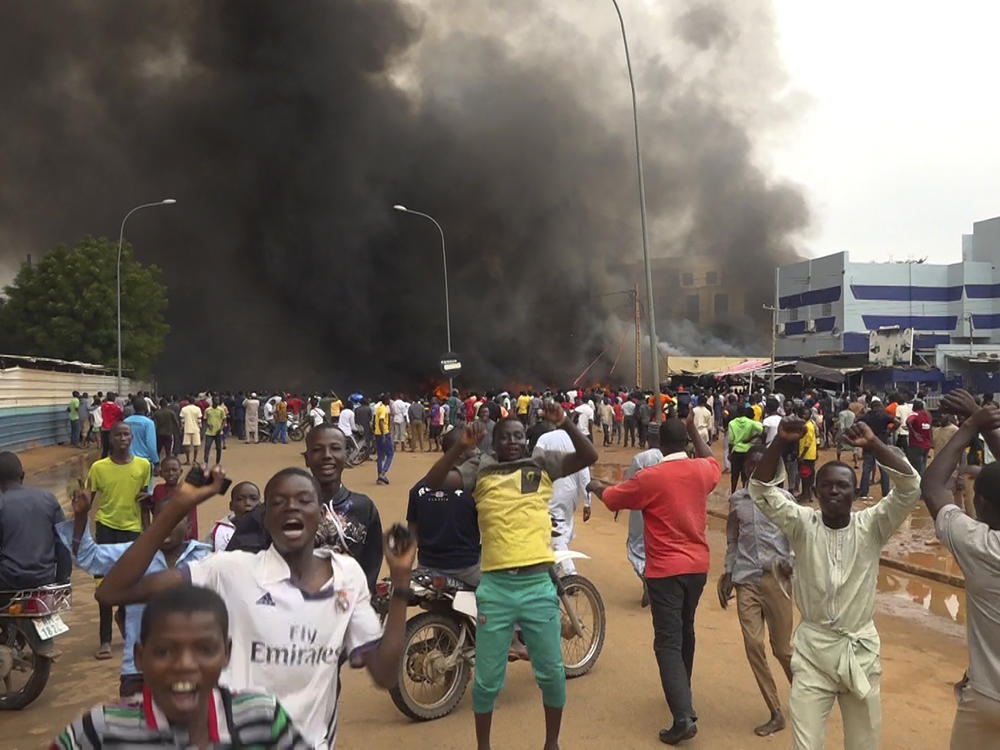Section Branding
Header Content
After the coups, West Africa's Brexit moment
Primary Content
LAGOS, Nigeria - Niger, Mali and Burkina Faso, three countries ruled by military juntas, overwhelmed by jihadist insurgencies and a series of coups in recent years, have severed ties with regional West African countries this week, and quit the regional bloc called ECOWAS.
It was announced on Sunday before it was communicated through official diplomatic channels, catching neighbouring leaders unaware, escalating a regional crisis. For several months, the three countries remained defiant, faced by a siege of sanctions and diplomatic pressure from ECOWAS, backed by France and the US, to transition back to democracy.
But the tensions have now led to a split that some experts have compared to "Brexit", when the United Kingdom left the European Union, because of the profound implications for millions of people across the region.
What is ECOWAS?
The Economic Community of West African States is a 15-nation regional bloc that was established in 1975. Each country takes a turn in leading the bloc, with the region's economic powerhouse, Nigeria, currently at the helm.
ECOWAS's goal is to promote regional cooperation and trade, providing visa-free travel across the region with the aim of raising " the living standards of its peoples, and to maintain and enhance economic stability."
It also plays a key role in peacekeeping in a highly unstable part of the continent and is a key security partner to the West, including the United States.
Why have Burkina Faso, Mali and Niger quit the bloc?
A wave of nine military takeovers in the last few years, described by some leaders as a contagion, has plunged the region into a political crisis. At the heart of it are three countries in the Sahel - the semi-arid strip stretching coast to coast, south of the Sahara desert. Mali went through two coups - in 2020 and 2021, Burkina Faso had two in the space of a year in 2022 and finally Niger, last summer.
In response ECOWAS suspended all three from the bloc and imposed harsh sanctions on Mali and on Niger after the coup there last July. Niger's borders and airspace was closed, trade was blocked, leading to a surge in food prices while preventing urgently needed medicines from entering the country. ECOWAS even threatened military intervention unless Niger's president Mohamed Bazoum was released from house arrest.
But the position of these regimes has only hardened. Bazoum remains in detention. All three threatened to respond to any military threat from the region, which never happened. They then withdrew from an international force set up to fight Islamists in the region known as the G5 and late last year, they formed a mutual defence pact, Alliance of Sahel States (AES).
Finally, on Sunday, Niger, Burkina Faso and Mali issued a joint statement in co-ordinated televised announcements. They declared their immediate withdrawal from the regional bloc, accused ECOWAS of being influenced by "foreign powers" and said their withdrawal from the union was "effective immediately." They said the sanctions imposed on them were "illegitimate, inhumane and irresponsible."
The withdrawal marks yet another chapter to the crises in West Africa, a region gripped by political instability and rising violence, since a jihadist insurgency erupted in Mali in 2012 and spread to neighbouring countries.
What's been the response to this in the region?
On Monday, Nigeria, which currently chairs the bloc, released a statement expressing sadness at the decision. "Nigeria has worked sincerely and in good faith to reach out to all members of the ECOWAS family and resolve the issues being faced," it said.
Yet within Nigeria, the split has led to scrutiny on President Bola Tinubu's leadership of the bloc since he was elected last May, according to Afolabi Adekaiyaoja, a political analyst at the Centre of Democracy and Development in Nigeria, many are now questioning the effectiveness of Nigeria's leadership.
"When President Tinubu was made the chair of ECOWAS, he ended his speech by saying Nigeria is back, but the question now remains, how effective has Nigeria been in steering the affairs of ECOWAS?"
The threat of military intervention against Niger by ECOWAS, a move backed by France, marked a more combative approach. But the threat only galvanised thousands to come out onto the streets in the Nigerien capital Niamey in support of the junta. The sanctions have also fuelled resentment, according to Ulf Laessing, the Director of Regional Sahel programmes at the Konrad Adenauer Foundation in Mali.
"The sanctions against Niger really backfired spectacularly. The idea was of ECOWAS and some Western countries like France, that it could force the military govt to quit power if you basically impose a total trade embargo against the country," he said, but it had the opposite effect.
"Sanctions never work to influence politicians. They always hit the wrong people, poor people."
How will this decision affect these countries, which up till now have heavily relied on ECOWAS for trade?
Laessing compared the decision of the three landlocked countries to break away as a major split, comparable to Brexit, when the United Kingdom left the European Union, because the economic impact will be dramatic.
"Mali, Burkina Faso and Niger depend on imports and consumer goods from West African ports such as Dakar, Abidjan, also Lagos," Laessing said. "If they now quit ECOWAS , it will be difficult to keep supplies going."
Despite that, the decision to leave the bloc was a largely popular one, he said, made by military leaders, eager to stay in power. They took over from governments that were allies with France, a deeply unpopular former colonial ruler, widely seen as having too much influence or even control over their former colonies, and formed closer ties with Russia.
"They're probably also being encouraged by Russia to leave ECOWAS", Laessing said. The Russian paramilitary group, Wagner, was very active in the region before it was disbanded.
But the decision is also double-edged. Unstable economic conditions could eventually lead to more pressure on military regimes, already struggling to contain insecurity.
Copyright 2024 NPR. To see more, visit https://www.npr.org.



